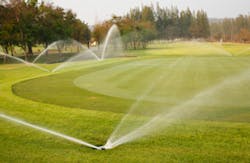It seems that every day there is a news story about the diminishing water supply in various areas of the U.S. and around the world. According to the Water Resources Group, water demand is expected to exceed current supply by 40 percent by 2030. Climate change is taking its toll on certain arid regions, and alternative water sources and conservation methods need to be considered by municipalities and industrial facilities to keep these areas viable in the long run.
Statistics from the National Academy of Sciences have shown that the U.S. would increase its water supply by 27 percent if all the wastewater currently dumped into waterways was recycled; that would be up to 12 billion gallons of reusable water.
Industrial facilities use vast amounts of water each year in processing and manufacturing the goods that appear on our supermarket shelves. For example, it takes approximately 270 gallons of water to produce one dollar worth of sugar, 200 gallons of water to manufacture one dollar worth of pet food and 140 gallons of water to produce one dollar worth of milk.
Wastewater from facilities involved in food processing, pharmaceutical manufacturing or petroleum production or businesses like carwashes or laundromats can be reused in non-potable water applications to reduce the use of groundwater and other potable water sources in industrial and municipal settings.
One notable way wastewater can be reused is for municipal irrigation, from golf courses to public parks to highway medians. According to the Center for Sustainable Systems at the University of Michigan, approximately one billion gallons per day of treated wastewater has been reclaimed in the past 15 years for uses such as irrigation of golf courses and public parks, and this number could be greatly increased if more municipalities took advantage of the opportunity.
In California, where an ongoing drought is making water for all applications scarce, the Pleasant Grove Water Treatment Plant in Roseville takes in seven million gallons of wastewater from toilets, faucets, showers and businesses every day, cleans and disinfects it, and uses it to irrigate the region's parks, golf courses and median landscaping, according to an article by KCRA.
Wastewater also holds a multitude of possibilities for industrial facilities. According to the U.S. Environmental Protection Agency, recycled water can be used not only for agriculture and irrigation, but also for cooling water for power plants and oil refineries, as processing water for mills or plants, for toilet flushing, dust control, construction activities, concrete mixing and artificial lakes.
In the future, it could be bad business to avoid these conservation solutions, as municipalities may start to charge more for water usage as shortages continue.
An added benefit of reusing wastewater is that you would assuage the growing concerns of private citizens over water contamination. Petroleum wastewater could be treated, and the petroleum-free water used again.
Whether the reason for using wastewater in municipal and industrial settings is due to government regulations, rising water costs or a concern for the environment, it is surely a good business decision in both the short and long term, providing both cost-savings and less limited resources for any application.
Information for this article was taken from this article by Patricia Els, which appeared in the December 2013 issue of Water Technology.
